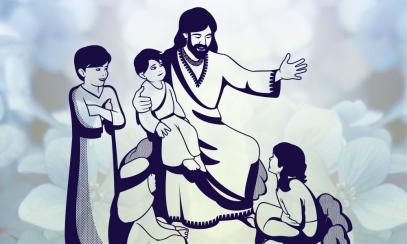
Via Fidelis: The gift of the sacramental life of the Church
God refuses to remain distant. While many people experience the Divine as an abstract or philosophical concept, Catholic Christianity offers something radically different: a God who enters our physical world through concrete, transformative encounters.
God refuses to remain distant. While many people experience the Divine as an abstract or philosophical concept, Catholic Christianity offers something radically different: a God who enters our physical world through concrete, transformative encounters.
These aren’t symbols or rituals — they are the seven sacraments, tangible moments where heaven touches earth and grace actively changes us. In a culture increasingly disconnected and hungry for authentic experience, the sacramental life of the Church provides what every human soul desperately seeks: real contact with the Divine.
We have explored the basic elements of the kerygma, the fundamental proclamation of salvation in Chris, over the last several months as we have journeyed on the Via Fidelis together. This has included God’s creative love that endures despite our sinfulness. This love overflows into the Incarnation (God the Son taking on our humanity) and the Paschal mystery (Jesus’ saving passion, death, resurrection and ascension). Most recently, we looked at the gift of the Church, which makes the Good News of salvation present in the world. The Church does this in a particularly special way — the sacraments. The Church is often described as a sacrament, a visible and effective sign of God’s saving grace, and the core of our mission and life as a Church is being that sign.
While tangible evidence of God’s super-abundant love for us can be encountered all over the place, the seven sacraments are particular signs of God’s saving grace that make salvation concretely and effectively available to us. We use the word “effectively” here because something actually happens in those moments of encounter in the sacraments. The saving love that drives the kerygma is, really, imparted to us and, provided that we cooperate with that grace, we, in turn, are transformed. This saving love has been a constant motif in this Via Fidelis series on the kerygma because God’s love is at the core of the Good News. Consequently, his love is at the core of the life of the Church.
Each sacrament effectively communicates this love in a particular way that meets our needs. The concreteness and tangibility of the sacraments is evidence of the Good News that God’s love always has the answer to our deepest needs and desires as human beings. We are embodied creatures and need bodily contact with the Divine. Without this contact, God’s love runs the risk of remaining a lofty idea that is never realized.
The sacrament of reconciliation is a great example here. As human beings, we experience all too often our own sinfulness and the broken relationships that sin yields. This is true even after we are united with Christ in baptism. This beautiful sacrament of reconciliation provides us with a tangible encounter with God’s mercy and a real experience of being reconciled to God and to his Church. We could go down the list of the seven sacraments and describe each one as part of God’s loving response to our needs. We will do that along the way as we continue our Via Fidelis five-year journey together.
For now, what is important to remember is that the seven sacraments individually and collectively shape and structure the life of the Church and the life of each Christian. As members of the Church, the cornerstone of our spirituality is living a sacramental life. This means recalling and using the grace given to us in the sacraments that are not repeated (baptism, confirmation, etc.) and the frequent utilization of those sacraments that can be received repeatedly — reconciliation and the Eucharist.
We also make use of sacramentals, physical objects or actions that are like the sacraments in that they signify some spiritual effect — blessings, holy water, relics and other sacred objects. While not numbered among the seven, sacramentals share in the broader sacramentality of the life of the Church and continue the work of presence imparted to us in the Incarnation.
All these elements of our spiritual life are rooted in the work of Christ in the Incarnation, the pivotal moment in history through which he embraced and transformed our concrete, embodied humanity. Therefore, our very life as Christians is and always should be oriented around the kerygma.
Michael Martocchio, Ph.D., is the secretary of discipleship and the director of the Office of Catechesis and Christian Initiation. Email him at mmartocchio@charlestondiocese.org.



